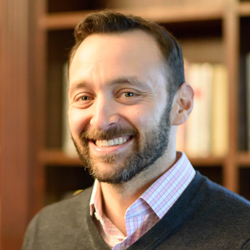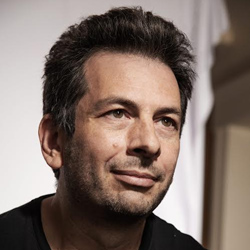Events
Past Event
WED@NICO WEBINAR: Noah Askin, INSEAD
Northwestern Institute on Complex Systems (NICO)
12:00 PM
Details

Speaker:
Noah Askin, Assistant Professor of Organisational Behaviour, INSEAD
Title:
Two Pathways to Creativity: How Collaboration Leads to Novelty in Popular Music
Abstract:
All cultural production starts with creativity. And despite the popular myth of the lone creative genius, it is well understood that creativity is a collaborative endeavor. Most research in sociology—particularly in the social network tradition—focuses on the structural dimension of collaboration, proposing that access to diverse collaborators unlocks creative production through exposure to diverse ideas and influences. Building on work in social psychology that examines the role of contextual factors in facilitating (or inhibiting) creativity, we argue that collaboration can foster creativity via a second path: via exposure to creative alters who provide inspiration and support during the creative process. Leveraging original data on over 25,000 musicians and 600,000 songs, we construct a feature-based measure of creative output (i.e., song novelty) and then estimate how artists’ collaboration networks affect their propensity to produce novel work—via access to diverse ideas or exposure to creative alters. Findings provide evidence of the two pathways to creativity and suggest that they interact in counter-intuitive ways. Better accounting for the sources of creative influence generates new insights into the production of novelty in music and the social organization of creativity itself.
Speaker Bio:
Noah Askin is an Assistant Professor of Organisational Behaviour at INSEAD in Fontainebleau. His research interests include social and cultural networks, the drivers and consequences of creativity and innovation (particularly in the music industry), the production and consumption of culture, and the dynamics of organisational and individual status. His research is divided among these interests in two streams. The first is around the creation and performance of cultural products: music chart and industry dynamics, the factors that contribute to creativity (especially the role played by diversity of one’s connections), the tradeoffs associated with being innovative, the implications of the shift to digital distribution, and the analysis of culture using big data. The second area of research is around the role and impact of network- and rankings-based status on organisations. His work, which has garnered him recognition on the Thinkers 50 Radar list, has appeared in Administrative Science Quarterly, American Sociological Review, computational social science publications, and been covered in the press by Rolling Stone, The Economist, Forbes, Business Insider, Quartz.com, The Times of London, M Magazine, the New York Post, and music industry blogs.
Webinar:
Webinar link: https://northwestern.zoom.us/j/96945660289
Passcode: nico
ID: 969 4566 0289
About the Speaker Series:
Wednesdays@NICO is a vibrant weekly seminar series focusing broadly on the topics of complex systems and data science. It brings together attendees ranging from graduate students to senior faculty who span all of the schools across Northwestern, from applied math to sociology to biology and every discipline in-between. Please visit: https://bit.ly/WedatNICO for information on future speakers.
Time
Wednesday, February 10, 2021 at 12:00 PM - 1:00 PM
Contact
Calendar
Northwestern Institute on Complex Systems (NICO)
WED@NICO SEMINAR: Julio M. Ottino, Northwestern University "From Clocks to Clouds: The Complexity Revolution"
Northwestern Institute on Complex Systems (NICO)
12:00 PM
//
Lower Level, Chambers Hall
Details

Speaker:
Julio M. Ottino, Walter P. Murphy Professor of Chemical and Biological Engineering, McCormick School of Engineering, Northwestern University
Title:
From Clocks to Clouds: The Complexity Revolution: How Scientific Breakthroughs Reshaped Reality and Our Place Within It
Abstract:
For three centuries, Western thought was guided by a Newtonian worldview: the universe as a vast clock, predictable and controllable. That vision has unraveled. Scientific revolutions—from relativity and quantum mechanics to evolution, game theory, and complexity science—have revealed a world of uncertainty, emergence, and creative interconnection. We now inhabit a “cloud world,” where relationships matter more than parts, and uncertainty is not ignorance but potential. This talk traces the transformation from clocks to complexity, showing how these revolutions reshape our understanding of reality and what it means to navigate knowledge, organizations, and society in turbulent times.
Speaker Bio:
Julio M. Ottino is an engineering scientist recognized for his work in fluid dynamics, chaos and nonlinear dynamics, complex systems, and especially mixing. He was born in La Plata, Argentina and grew up with twin interests in the physical sciences and visual arts. He obtained his first degree at the University of La Plata, in Argentina, before receiving a PhD in chemical engineering from the University of Minnesota. He is currently at the McCormick School of Engineering and Applied Science in Northwestern University where he holds the titles of Robert R. McCormick Institute Professor and Walter P. Murphy Professor of Chemical and Biological Engineering. He is also a professor of Management and Organizations at Kellogg School of Management. He was the co-founder and director of the Northwestern Institute on Complex Systems (NICO) and the author of the Kinematics of Mixing: Stretching, Chaos, and Transport (Cambridge University Press 1989) and The Nexus, Augmented Thinking for a Complex World, with Bruce Mau (MIT Press, 2022).
Location:
In person: Chambers Hall, 600 Foster Street, Lower Level
Remote option: https://northwestern.zoom.us/j/99053647199
Passcode: NICO25
About the Speaker Series:
Wednesdays@NICO is a vibrant weekly seminar series focusing broadly on the topics of complex systems, data science and network science. It brings together attendees ranging from graduate students to senior faculty who span all of the schools across Northwestern, from applied math to sociology to biology and every discipline in-between. Please visit: https://bit.ly/WedatNICO for information on future speakers.
Time
Wednesday, November 5, 2025 at 12:00 PM - 1:00 PM
Location
Lower Level, Chambers Hall Map
Contact
Calendar
Northwestern Institute on Complex Systems (NICO)
WED@NICO SEMINAR: Blaise Aguera y Arcas, Google "Symbiogenesis, Computational Parallelism, and Complexity in Evolution"
Northwestern Institute on Complex Systems (NICO)
12:00 PM
//
Lower Level, Chambers Hall
Details

Speaker:
Blaise Agüera y Arcas, VP/Fellow, CTO of Technology & Society, Google
Title:
Symbiogenesis, Computational Parallelism, and Complexity in Evolution
Abstract:
Symbiogenesis-- the fusion of formerly independent self-replicating entities into a larger self-replicating entity-- is proposed as the driving force behind evolution's "arrow of time" toward ever-increasing complexity. We'll explore an Artificial Life system as a minimal motivating example, then discuss the implications for biological evolution beyond the "standard" accounts of Major Evolutionary Transitions and "intelligence explosions" in brainy species. Energetic and computational implications will also be addressed.
Speaker Bio:
Blaise Agüera y Arcas is a VP and Fellow at Google, where he is the CTO of Technology & Society and founder of Paradigms of Intelligence (Pi). Pi is an organization working on fundamental research in AI and related fields, especially the foundations of neural computing, active inference, sociality, evolution, and Artificial Life.
In 2008, Blaise was awarded MIT’s TR35 prize. During his tenure at Google, Blaise has innovated on-device machine learning for Android and Pixel; invented Federated Learning, an approach to decentralized model training that avoids sharing private data; and founded the Artists + Machine Intelligence program.
An External Professor at Santa Fe Institute and a frequent public speaker, Blaise has given multiple TED talks and keynoted NeurIPS. He has also authored numerous papers, essays, op-eds, and chapters, as well as two previous books, Who Are We Now? and Ubi Sunt. His most recent book, What Is Life?, is part 1 of the larger book What Is Intelligence?, forthcoming from Antikythera and MIT Press in September 2025.
Location:
In person: Chambers Hall, 600 Foster Street, Lower Level
Remote option: https://northwestern.zoom.us/j/98741396308
Passcode: NICO25
About the Speaker Series:
Wednesdays@NICO is a vibrant weekly seminar series focusing broadly on the topics of complex systems, data science and network science. It brings together attendees ranging from graduate students to senior faculty who span all of the schools across Northwestern, from applied math to sociology to biology and every discipline in-between. Please visit: https://bit.ly/WedatNICO for information on future speakers.
Time
Wednesday, November 12, 2025 at 12:00 PM - 1:00 PM
Location
Lower Level, Chambers Hall Map
Contact
Calendar
Northwestern Institute on Complex Systems (NICO)
Data Science Nights - November 2025 - Speaker: Feihong Xu, ESAM
Northwestern Institute on Complex Systems (NICO)
5:30 PM
//
Lower Level, Chambers Hall
Details

NOVEMBER MEETING: Thursday, November 20, 2025 at 5:30pm (US Central)
LOCATION:
In person: Chambers Hall, Lower Level
600 Foster Steet, Evanston Campus
AGENDA:
5:30pm - Meet and greet with refreshments
6:00pm - Talk with Feihong Xu, Amaral Lab, ESAM
Talk title and abstract TBA.
DATA SCIENCE NIGHTS are monthly meetings featuring presentations and discussions about data-driven science and complex systems, organized by Northwestern University graduate students and scholars. Students and researchers of all levels are welcome! For more information: http://bit.ly/nico-dsn
Time
Thursday, November 20, 2025 at 5:30 PM - 7:30 PM
Location
Lower Level, Chambers Hall Map
Contact
Calendar
Northwestern Institute on Complex Systems (NICO)
Data Science Nights - December 2025 - Speaker: Yash Chainani, Chemical Engineering
Northwestern Institute on Complex Systems (NICO)
5:30 PM
//
Lower Level, Chambers Hall
Details

DECEMBER MEETING: Thursday, December 18, 2025 at 5:30pm (US Central)
LOCATION:
In person: Chambers Hall, Lower Level
600 Foster Steet, Evanston Campus
AGENDA:
5:30pm - Meet and greet with refreshments
6:00pm - Talk with Yash Chainani, Broadbelt & Tyo Labs, Chemical Engineering
Talk title and abstract TBA.
DATA SCIENCE NIGHTS are monthly meetings featuring presentations and discussions about data-driven science and complex systems, organized by Northwestern University graduate students and scholars. Students and researchers of all levels are welcome! For more information: http://bit.ly/nico-dsn
Time
Thursday, December 18, 2025 at 5:30 PM - 7:30 PM
Location
Lower Level, Chambers Hall Map
Contact
Calendar
Northwestern Institute on Complex Systems (NICO)

